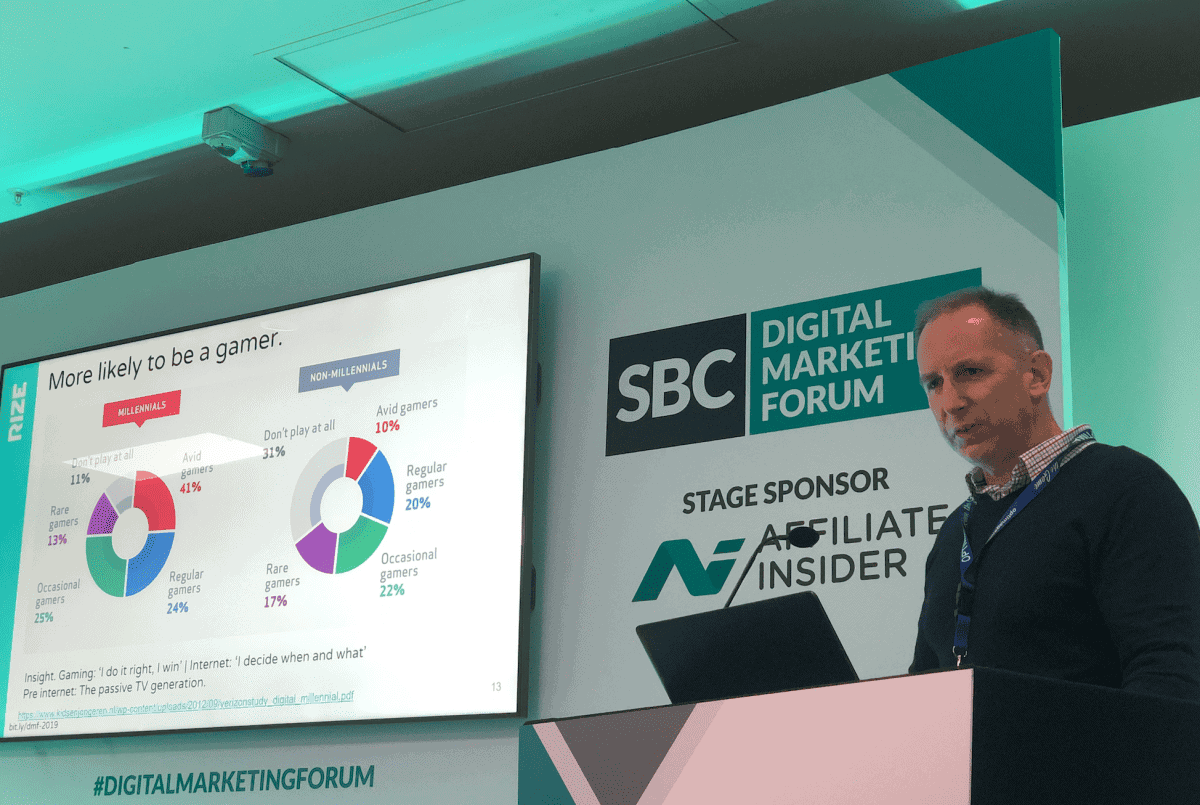DMF Session Highlight : Gamer Gambling – Opportunity or Trend?

Gen Z and Millennial gambling habits were discussed at the Digital Marketing Forum last week. Nick Garner has pulled together a quick summary this morning of the stats he presented so that we could share it out to the wider affiliate community. Nick explains why this gambling trend is proving popular with millennials and how it should be observed.
Millennials don’t really like slots or traditional casinos.
This lead to a few good points being made at the start of his session:
- Why the lack of uptake with traditional casino?
- What’s filling the ‘casino gambling’ vacuum if they’re not playing in regular casinos?
- What can affiliates and operators in regular iGaming do about this?
Growing up
When we grow up our brains form. Habits are deeply encoded into the way we think. For Gen Z and millennials, massive influencing factors have included:
- The Internet
- The fall of broadcast media
- MMORPG (Massively multiplayer online role-playing games)
These high-level influences mean that Gen Z and Millennial consumers have shifted away from:
- Being fed entertainment through the broadcast schedule >> to on demand entertainment.
- Solitary entertainment ( watching TV ) >> Sociable online role-playing games
- Working to the broadcast schedule >> Entertainment working to your schedule
According to various sources there are something like 2.4 billion individuals have bought a non-gambling game in the last year. Of those, there are supposedly 400 million people who see themselves as ‘gamers’. And of those 400 million people, approximately 40% are women.
- With Gen Z and Millennials, around 65% of these individuals describe themselves as ‘avid or regular gamers’.
- For non Gen-Z and Millennials, around 30% of these individuals describe themselves as ‘avid or regular gamers’.
Upshot: Older people aren’t so into gaming.
Now let’s think about Esports. It’s sports betting on gamer tournaments. Teams compete against each other playing MMORPG’s i.e. CS:GO. Best team wins. Just like a football tournament.
Some of the most popular esports games include:
- Dota 2
- Counter-Strike: Global Offensive
- Fortnite
- League of Legends
- StarCraft II
Esports betting is building momentum and will grow comfortably within the iGaming regulatory frameworks we now have ? It’s effectively just sports betting.
Casino gambling
Millennials just don’t like casino gambling that much:
- Gambling was more important to non millennials (42% to 21%)
- Millennials reported spending only 8.5% of their total budget on gambling compared to 23.5% of non millennials.
- 35% of millennials would increase spending on gambling compared to 50% non millennials.
*Source: Lloyd D. Levenson Institute of Gaming at Stockton University
In fact, studies show that Millennials don’t like slots. Anecdotally the reason is fairly obvious.
- Basic slots are easy to understand, but advanced features such as play lines, free games, free spins, volatility and so on are hard to comprehend.
- Whilst it’s these games need time and usage to understand, ultimately they are zero skill.
- There is an illusion of control. But once you understand slots, you know players have no control over the outcome.
Slots: You press the button, the wheel spins and you roll with ‘lady luck’.
The answer?
Nevada legislated for skill-based lots, but they didn’t work. Instead like so many innovations, the answer has come from ‘left-field’ in the form of unregulated crypto currency gambling.
The real answer
All these ‘gamer gambler’ games have these themes in common:
- Small bets
- Sociable interaction via IM.
- Very simple to play
- Often a risk management component I.e. play skilfully and you maximise player return.
In a typical successful ‘gamer gambler’ casino site, you’ll have 1000+ concurrent players betting on games like:
- Crash
- ‘Strip’ roulette
- Hi/lo
- Wheel of Fortune
- And very simple versions of slots games… Sometimes
Relating all of this to iGaming business models
There are pure play online casinos and sports books who are cross selling casino to their existing customers.
Esports is sports book, but those regulated operators don’t have an attractive casino product to cross sell into. The games I’ve mentioned won’t be seen on a tier 1 or 2 regulated operator any time soon. The regulatory barriers are too high for game providers to take a chance with. So,it’s easier to create another slots game.
Darwinian selection
With the lack of regulatory controls, hundreds of different gamer gambler brands have evolved with around 8 mega brands breaking through. These include:
- hellcase.com
- wtfskins.com
- csgo500.com
- csgoempire.com
- csgoatse.com
- gamdom.com
- csgolive.com
- skinhub.com
- csgofast.com
- stake.com
This ecosystem is a great example of Darwinian natural selection. I.e. hundreds of ideas getting tested at a low cost with a few strong ideas breaking through.
Why don’t we hear more about gamer gambling?
When new markets open up, iGaming goes into ‘hype overdrive’. Previously it was crypto currency, now it’s the US market. Gamer gambling isn’t getting that much traction because regulatory constraints are difficult to overcome and Gamer Gambler websites aren’t like any regular casino you’ve ever seen. Therefore iGaming operators will have to change their existing sites dramatically or launch new brands.
Overall this is a very interesting growth market that is being largely ignored by the iGaming community. If you’re an affiliate, you’ll want to check this out. If you’re an operator, perhaps do a joint venture with an affiliate to test the water
For more detail, graphs, sources and information about gamer gambling, you can download Nick’s presentation HERE.
________________________________________________________________________About the Author:
Nick Garner is founder of RIZE.digital and expert in SEO and online marketing strategy. He has also been involved in crypto gambling for some years.






